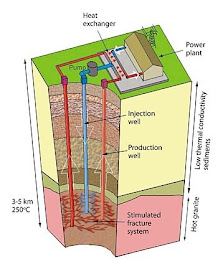TASMANIA could be generating clean, renewable geothermal power within five years, say the leaders of the emerging industry.
Companies with geothermal, or hot rock, tenements have stepped up their exploration efforts across vast areas of the state during the past month.
Industry experts say geothermal energy has the potential to replace coal as the major energy resource in Australia and Tasmania is of particular interest because of its proximity to transmission infrastructure.
"Hot rock" energy is generated by pumping water up to 5km underground and harnessing the earth's heat to run steam-driven turbines.
KUTh Energy has the largest geothermal exploration lease in Australia, covering 14,000sqkm from south of Hobart to the mouth of the Tamar River.
The company plans to spend $3 million to $4 million on exploration over the next three years, including its present drilling program in the Midlands.
While general manager Malcolm Ward was cautious about making promises, he said the company aimed to have a power station online within five years.
It would cost at least $35 million to get the pilot power station up and running.
"If everything goes well we could have a small five-megawatt generating capacity in three to five years," Mr Ward said.
That would provide enough to power a town of 5000 people.
However, once a resource is found, more power can be generated simply by drilling new holes and adding more turbines.
"We don't know how much power we will ultimately generate but we have an ambition to get to 200 megawatts," Mr Ward said.
Geothermal Energy Tasmania general manager Lindsay Newnham said Tasmania had huge potential for geothermal power.
His company, which is a subsidiary of Allegiance Mining, has tenements across the North and West of the state.
"I think Tasmania is in a unique position and the whole state has tremendous potential for hot-rock geothermal energy," Mr Newnham said.
Geological surveys have shown Tasmania has large areas of hot granite which are essential for heating water to the super-hot temperatures required to generate electricity.
The extensive high-voltage network also means power could be distributed from anywhere in the state and sold to the mainland via Basslink.
Geothermal power is unique because, unlike other renewables like wind and solar, it is capable of delivering an uninterrupted baseload supply.
That means it could play a vital role in supplementing the state's growing energy needs.
Last week Transend announced a major upgrade of its distribution network because of increased use of power-hungry air conditioners, plasma TVs and "McMansions".
"Tasmania has hydro electricity which is good but Tasmania is growing and there are not going to be any more hydro schemes built, so we have a chance to meet that demand," Mr Ward said.
More alternative energy news:
WindIntell.com: Wind Energy Investing, Windpower Stocks Info
SolarIntell.com: Alternative Energy Investing, Renewable Power Stocks








No comments:
Post a Comment